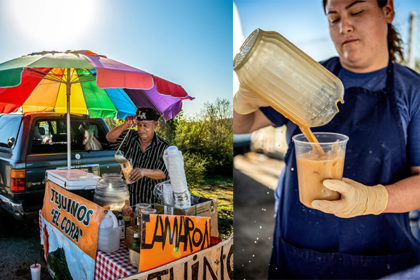
“Most people outside Mexico are familiar with the country’s tradition of distillates and beers. Far fewer have experienced an entire galaxy of beverages, like tejuino , that are much less available here in Southern California. They are made with Indigenous-based practices, typically inside people’s homes, usually with a plant, like corn, that’s already used for a bunch of other things in Mexico.”
A Los Angeles Times article highlights Mexican fermented drinks, like tepache, tejuino and pulque. They’re common in Mexico, brewed in home kitchens and sold at roadside stands. But in L.A. County where almost 4 million people trace their roots to Mexico, these rustic fermented beverages remain uncommercialized. Are Mexico’s artisanal, fermented drinks the last “importation of Mexican culinary practices to the United States?” the article speculates.
Tepache is the closest to breakthrough status in the U.S., with more companies offering canned versions. De La Calle Tepache was started by co-founder Rafael Martin using his grandmother’s recipe (he later studied fermentation in college). Ingredients in De La Calle Tepache are traditional to and sourced from Mexico. Martin describes his clientele as “chipsters” crowd – a slang term for Chicano hipsters.
Pulque, on the other hand, is difficult to replicate. The fermented aquamiel sap (from the core of the agave plant) only lasts two days before it starts to go bad. Some academics argue ferments from Mexico should be “more aggressively cataloged, preserved and consumed.” Scientists from the University of Arizona and four universities in Mexico recently published their research highlighting 16 of Mexico’s fermented beverages.
Read more (Los Angeles Times)
